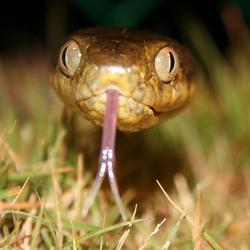Paul Heimowitz
Paul is the terrestrial invasive species program manager within the Biological Threats and Invasive Species Program of the Ecosystems Mission Area. He coordinates research on prevention, detection, monitoring, control, and other management priorities addressing a wide range of terrestrial plants (e.g., cheatgrass and tamarisk) and animals (e.g., Burmese python and brown tree snake).
Paul has nearly 25 years of experience working on invasive species prevention, detection, control, and outreach at regional, national, and international levels. Paul began his conservation career working on oil spill response, damage assessment, and habitat restoration with the state of Washington. He then took a Sea Grant Extension position with Oregon State University that shifted his focus to biological invasions. He came to USGS in 2022 after nearly 20 years working as an invasive species specialist with the U.S. Fish and Wildlife Service Pacific Region. While with USFWS, Paul’s roles included leading development of a first-of-its-kind regional invasive species prevention policy, coordinating the creation of a rapid response plan and exercise program for invasive mussels in the Columbia River Basin, and co-founding the Northwest Regional Invasive Species and Climate Change network. He is a graduate of the USFWS Advance Leadership Development Program.
Professional Experience
As a biologist with the U.S. Fish and Wildlife Service Ecological Services Program in the Pacific Region, Paul supported field-based invasive species management at field offices and led a cross-program effort to develop technical guidance on the relocation of native species outside their native range for conservation purposes.
As a biologist with the U.S. Fish and Wildlife Service Science Applications Program in the Pacific Region, Paul led cross-program invasive species efforts (including development of a first-of-its-kind regional invasive species prevention policy), coordinated the Region's Science Support Partnership program in collaboration with USGS, and helped establish an annual regional science conference.
As a biologist with the U.S. Fish and Wildlife Service Fish and Aquatic Habitat Program in the Pacific Region, Paul coordinated aquatic invasive species management and science activities in the Pacific Northwest and Pacific Islands, including co-leadership of a rapid response planning and exercise program for invasive mussels in the Columbia River Basin.
While at U.S. Fish and Wildlife Service, Paul completed the Advanced Leadership Development Program and served as a coach for the Stepping Up To Leadership program.
As an assistant professor with Oregon State University Sea Grant Extension, Paul developed and implemented outreach and technical assistance programs addressing aquatic invasive species and other water quality management challenges
As an environmental planner with the Washington Department of Ecology, Paul worked on oil spill response, damage assessment, and habitat restoration in Puget Sound and other aquatic resources. of aquatic habitats.
Education and Certifications
M.S. 1990, Oregon State University, Marine Resources Management
B.S. 1987, University of Arizona, Ecology and Evolutionary Biology
Affiliations and Memberships*
Member, North American Invasive Species Management Association
Science and Products
The emerging invasive species and climate change lexicon The emerging invasive species and climate change lexicon
Invasive species research—Science for prevention, detection, containment, and control Invasive species research—Science for prevention, detection, containment, and control
A Matter of Scales: USGS Science to Reduce Invasive Snake Impacts
Invasive Plants We Study: Melaleuca
Invasive Plants We Study: Brazilian Waterweed
Invasive Plants We Study: Reed Canary Grass
Invasive Species We Study: Buffelgrass
Invasive Plants We Study: Leafy Spurge
Invasive Plants We Study: Brome
Invasive Plants We Study: Siberian Elm
Invasive Plants We Study: Saltcedar
Invasive Plants We Study: Russian Olive
Invasive Plants We Study: Phragmites
Invasive Plants We Study: Cheatgrass
Science and Products
The emerging invasive species and climate change lexicon The emerging invasive species and climate change lexicon
Invasive species research—Science for prevention, detection, containment, and control Invasive species research—Science for prevention, detection, containment, and control
A Matter of Scales: USGS Science to Reduce Invasive Snake Impacts
Invasive Plants We Study: Melaleuca
Invasive Plants We Study: Brazilian Waterweed
Invasive Plants We Study: Reed Canary Grass
Invasive Species We Study: Buffelgrass
Invasive Plants We Study: Leafy Spurge
Invasive Plants We Study: Brome
Invasive Plants We Study: Siberian Elm
Invasive Plants We Study: Saltcedar
Invasive Plants We Study: Russian Olive
Invasive Plants We Study: Phragmites
Invasive Plants We Study: Cheatgrass
*Disclaimer: Listing outside positions with professional scientific organizations on this Staff Profile are for informational purposes only and do not constitute an endorsement of those professional scientific organizations or their activities by the USGS, Department of the Interior, or U.S. Government













